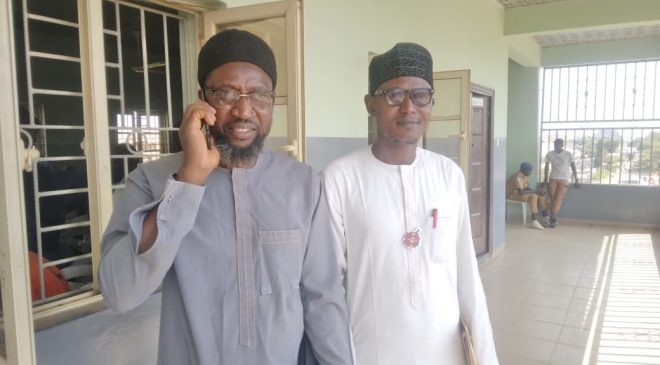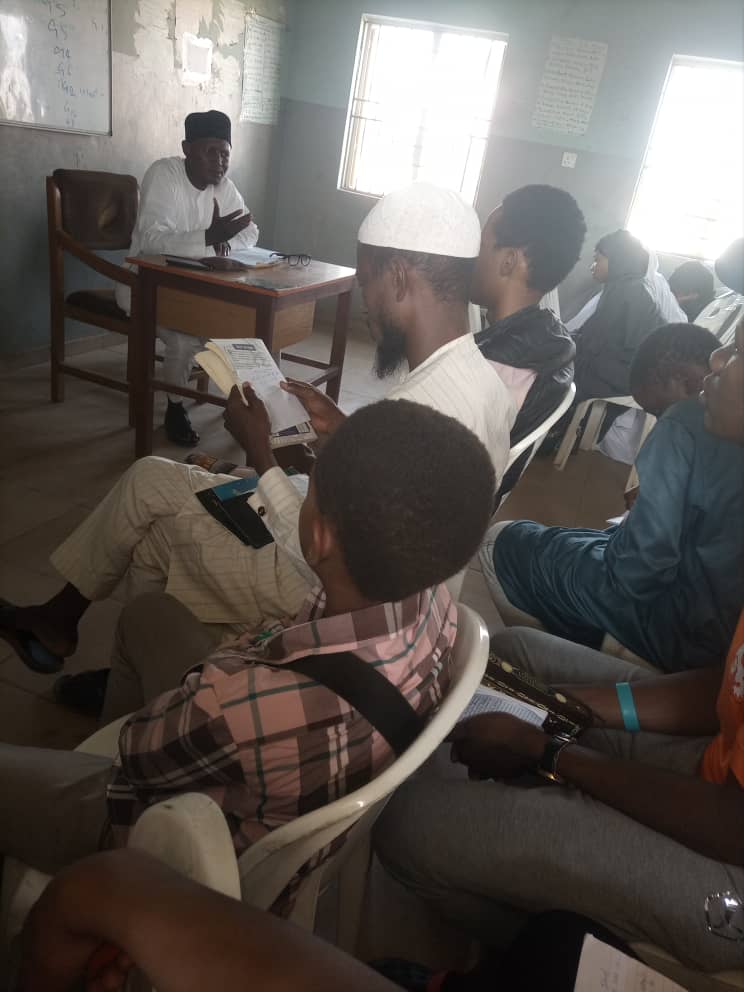Coalition of Muslim Youth Organization in Karu has began its annual Islamic Vacation Course,the 10th edition in Abuja
While delivering his lecture titled;”VOLUNTEERISM MODERN DAY JIHAD”, Ustaz Yunus Salahudeen,who is also Consultant, Al-Ansar Children’s Home Kuje- Abuja, described Volunteering as lifeline of every community.
Ustaz Salahudeen urged Muslims to cultivate the act of Volunteerism in their everyday life to change the narrative for better positively in Cosmopolitan Society.


The lecture read in full;
“It is because of volunteers that communities are able to run organisations, social services, conferences, playgroups, drop-in centres, feed the hungry, shelter the homeless, open libraries, run schools, set up blood banks…the list goes on. Paid employees only make up a small part of the social services network, without volunteers such endeavors would come to a standstill.
“As Muslims, our role isn’t just to make our salat and fast and pay zakat. We are encouraged to take on a broader role by working to improve the communities we live in; visiting the sick, feeding the hungry, teaching people to read, helping people who have no one to turn to. It is by translating our love of Allah into good actions that we strengthen our faith. Islam is a faith of action and we need to demonstrate our faith by working to make the world a better place.
What does Islam say about volunteering?
In Islam there is a strong ethic of volunteerism. This does not simply extend to running study circles or fundraising for the mosque. As Muslims, we see our role as world citizens. The idea of working for a better society or community shouldn’t be limited to the Muslim community but extend to the broader non-Muslim community as we live in the community altogether.
“As a community, Muslims need to cultivate a culture of volunteerism. There is a persistent notion that volunteers are essentially free labour. Their efforts are not appreciated and, indeed, are often criticised. We need to shift our perception and see that it is because of volunteers that so many of the services we need are available. Entire mosques have been built through the efforts of volunteers, conferences are run by volunteers, Eid prayers are organised by volunteers, schools are run, in large part, by volunteers, magazines are written for and published by volunteers and so on.
“It is also important to note that volunteering should be a priority. Typically, Muslims see volunteering as something that should be done when you have nothing else to do. This should not be the case. If people generally see volunteering as something secondary and less important, the quality of the effort is greatly diminished. Volunteering must be as important as other pursuits.
Volunteering should be done by professionals. This is not to say that unless you have a graduate degree in mathematics, you shouldn’t help with an after-school tutoring program. Rather, if you have that graduate degree or are a teacher, you should be the one who should take the initiative in starting the tutoring program. Your skills will be invaluable to that program. If all the math tutors are people who have weak math skills, the effort will be a waste of everyone’s time and resources. Not to mention the students who will continue to fail their math tests.
“It is exceedingly important to avoid volunteer burnout. In every community there are a core group of volunteers and the Muslim community is no different. We all know the one Muslim brother or sister who helps out at all the events and is always working at breakneck speed. This is not fair. It is of no help to leave all the work to a few frazzled people while the rest sit back and enjoy the fruits of their labour. The core group eventually burns out. They have other obligations — family, work, social activities. When they are worn out and drop out, the whole community feels their absence.
‘The benefits
Volunteering has many benefits. Because of people’s willingness to work for free, many services can be offered at a lower cost or even for free, there is far more flexibility in the delivery of services since more people are available to help, volunteering gives individuals a broader sense of community and people also feel a greater connection to one another when they are involved in volunteer activities.
There are also personal benefits for the volunteer. We understand that our primary motivation for helping others should be our love for Allah but that doesn’t mean we can’t benefit from our volunteer activities. Many volunteers have learned invaluable skills and have made personal contacts that have helped them in securing employment later on. Also, for students, volunteering is an excellent way to build up a resume and gain a wide range of experience that can certainly help when it comes time to apply to college and university.
“Rules when volunteering
There are also some important rules to remember when volunteering:
1. No volunteer is to brag about giving his time, effort, energy, knowledge and memory when he is doing it fee sabeelillah (in the way of Allah).
2. No volunteer should accuse the employees that they are receiving money from the general budget of the community, while he is doing it for free.
3. No volunteer should accept a job or a title for the sake of show, or else it will become hypocrisy.
4. No volunteer should accept a title or a job when he knows that he is not qualified for the job.
5. No volunteer should accept a title, while knowing that he has no time to volunteer for such a job.
6. Khidmah Organisation is only able to hold its events through the help and assistance of volunteers. All those involved with the set up are volunteers without whom the events would not be possible.
“Volunteering is a lifelong way of helping others and to make a difference.
“The service you do for others is the rent you pay for your room here on Earth.”
― Muhammad Ali
Sheikh Ibrahim Djema
To be an upright and productive Muslim, there is more we must do than listening to lectures, attending seminars, and going to the masjid. A Muslim must have a positive impact on his/her community.
Volunteerism is not a new concept in Islam.
“We can start our discussion by examining the word ‘volunteering’ as used in the Holy Qur’an, referring to the voluntary or supererogatory acts of worship.
“And whoever volunteers good [i.e. excess] – it is better for him” (Holy Qur’an 2:184)
“And whoever volunteers good – then indeed, Allah is Appreciative and Knowing.” (Holy Qur’an 2: 158)
Every Muslim will be rewarded for fulfilling their obligatory acts of worship, such as fasting Ramadan. In fact, it is forbidden to abandon the obligatory acts of worship; fasting Ramadan, praying 5 times a day, and paying the zakat. However, when Muslims take an extra step to perform voluntary fasts, such as fasting every Monday and Thursday or fasting the first 10 days of Dhul-Hijjah, their rewards are bountifully multiplied. Allah loves to see His faithful servants performing voluntary acts of worship.
“In an authentic Hadith, Abu Hurayrah narrated that the Messenger of Allah (peace be upon him) said, “Allah says: ‘My slave does not draw closer to Me by anything more beloved to Me than that which I have made obligatory upon him, and My slave continues to draw closer to Me by doing nawafil (supererogatory or voluntary) deeds until I love him, and if I love him I will be his hearing with which he hears, his vision with which he sees, his hand with which he strikes and his foot with which he walks. If he were to ask of Me, I would surely give to him; if he were to seek refuge with Me, I would surely grant him refuge.’” (Al-Bukhari)
Allah loves to see the believers doing more and above what is commanded upon them. That includes volunteering your time, money, skills, and efforts to serve your community.
“Allah says in the Holy Qur’an, “So race to [all that is] good.” (Holy Qur’an 2:148)
Try to be the best, and to be the first one to do good and to help others. Be proactive.
“Allah says in the following verse, “O you who have believed, bow and prostrate and worship your Lord and do good – that you may succeed.” (Holy Qur’an 22:77)
Islam teaches us to spread goodness.
Prophet Muhammad (peace be upon him) said, “The most beloved people to Allah are those who are most beneficial to the people.” (Al-Mu`jam Al-Awsat)
This is a wide gate open to us to earn immense rewards from Allah. Muslims before us in history understood the value of giving, of serving others, and expending themselves and their wealth for the benefit of their communities.
“It was a common practice of Prophet Muhammad (peace be upon him) to rally the Muslims in Madinah to work together to support a noble cause, to help the poor, and to donate generously. The Prophet (peace be upon him) asked the wealthy Muslims to give to the people of As-Suffah, the poorest of Al-Madinah. Upon his initial arrival in Madinah after his migration, Prophet Muhammad (peace be upon him) asked the Muslims for donations to build the masjid.
The Prophet (peace be upon him) constantly inspired his companions to develop a spirit of giving and helping.
He (peace be upon him) said, “The most beloved deed to Allah is to make a Muslim happy, or to remove one of his troubles, or to forgive his debt, or to feed his hunger. That I walk with a brother regarding a need is more beloved to me than that I seclude myself in this mosque in Al-Madinah for a month. Whoever walks with his brother regarding a need until he secures it for him, then Allah the Exalted will make his footing firm across the bridge on the day when the footings are shaken.” (Al-Mu`jam Al-Awsat)
“There are many brothers and sisters who need the help and support of the Muslim community. Some people living in our community have no family or alternate support network, and they need us to be by their side.
“Another act of goodness that many of us may be unaware of is to help make peace between people, to reconcile between quarreling people in the community, or to help family members resolve their disputes, or bring reconciliation and forgiveness between a husband and wife.
The Messenger of Allah (peace be upon him) asked his companions, “Shall I not tell you something that is better than the status of (voluntary) fasting, prayer, and charity?” They said, “Yes.” He (peace be upon him) said, “Reconciling in a case of discord.” (At-Tirmidhi)
“An integral part of your faith is to have good, harmonious relationships with your brothers and sisters in Islam.
“The believers are but brothers, so make settlement between your brothers. And fear Allah that you may receive mercy.” (Holy Qur’an 49:10)
“I would like to conclude with a story. Many of us know this story but how many of us implement the lessons learned from this story?
It is the story of Umm Mihjan, a , poor, black-skinned woman who had no place to stay, so she lived in the Masjid of Al-Madinah and she used to clean the masjid and look after its upkeep.
“Aby Hurayrah reported, “A black woman used to clean the mosque. The Messenger of Allah (peace be upon him) missed her and asked about her. He was told that she had died. He (peace be upon him) said, “Why did you not inform me?’” (It seemed as if) they (Companions) considered the matter insignificant. Then he (peace be upon him) said, “Show me her grave.’” When it was shown to him, he offered Janazah (funeral) prayer over it and said, “These graves cover those in them with darkness, and Allah illumines them for the inmates as a result of my supplication for them.” (Al-Bukhari and Muslim)
As Muslims, we should look out for one another. We need to be active and we need to serve our communities.
“Imam As-Suyuti commented that when you do something for the sake of Allah, you will receive the rewards and taste its pleasantness not only in the Hereafter, but also in this life. This black woman who served her community by cleaning the masjid was honored by the Prophet of mercy; he visited her grave to pray for Allah’s mercy and forgiveness for her.
Allah says in the Qur’an, “Is the reward for good [anything] but good?” (Holy Qur’an 55:60)
“When you sow the seeds of goodness, you will reap goodness”.
Ustaz Yunus Salahudeen encouraged the general public to find time to visit Al-Ansar Children’s Home located at Hajiya Zara Street, Kuje Abuja as part of their Volunteerism work towards Orphans and Vulnerable Children.




